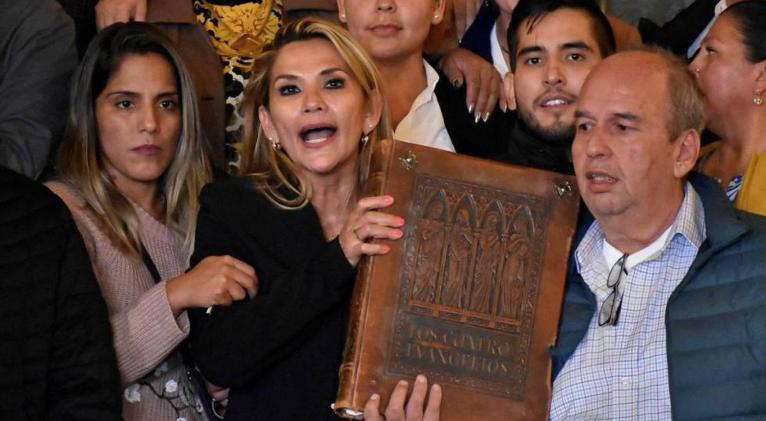Bolivian court rules that Jeanine Áñez's self-proclamation was unconstitutional

The Plurinational Constitutional Court (TCP) of Bolivia ruled on Friday that the self-proclamation of Jeanine Áñez as de facto president after the 2019 coup d'état, was illegal as there was no power vacuum.
The ruling issued by the TCP defines the non-correspondence of an 'ipso facto' succession, which applies only to the Presidencies of the Legislative Chambers, in reference to the appeal filed by the then deputy Margarita Fernández, of the Democratic Unity (UD) party, against the president and first vice-president of the Chamber of Deputies, Víctor Borda and Susana Rivero, respectively, at that time.
Fernández argued in the files that "the succession 'ipso facto' did not correspond to his former colleague Rivero because she 'published in her Twitter account a letter of irrevocable resignation addressed to the whole country."
The TCP, based on the Regulations of the Chamber of Deputies, alleged that exclusively in case of being considered in the plenary of the chambers, the resignations of the legislative authorities elected by popular vote are effective.
The sentence sustains that "it must be understood that, unlike the presidential succession, which the appellant demands to be applied in an analogous manner in his case, this one is effectively applied 'ipso facto' from the Presidency to the Vice Presidency of the State".
Therefore, the resignation of former Congresswoman Rivero "took effect only after the Legislature became aware of, dealt with and accepted that resignation. The figure of 'vacuum of power' does not exist to justify the non-compliance with this legal requirement," the text adds.
Añez, who at the time was the second vice-president of the Chamber of Senators, alleged that there was a power vacuum due to the resignations of then president Evo Morales, vice-president Álvaro García Linera and the head of the Senate, Adriana Salvatierra.
For his part, the then president of the Chamber of Deputies, Borda, had resigned before Morales' resignation. After these successive resignations, Añez first declared herself president of that chamber and then of Bolivia, without having a quorum or the assistance of the legislative majority, two thirds of which belonged to the Movimiento Al Socialismo (MAS).
The sentence clarifies that Fernandez only temporarily held the presidency of the Chamber, while Rivero was impeded. Unlike the presidential succession, which may occur ipso facto, the law states that this figure is not applicable in the case of the Presidency of the Chamber of Deputies, since resignations must be accepted by the legislative plenary.














Add new comment